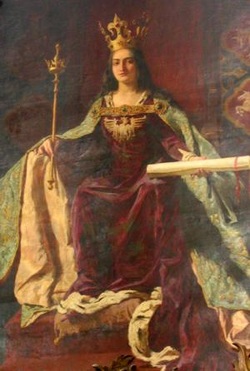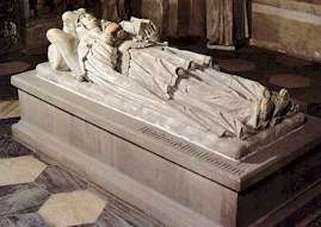
Hedwig, a Princess, in whom the splendour of her family was outshone by the radiant innocency of her life, was the daughter of Berthold and Agness, Marquess and Marchioness of Moravia, and maternal aunt to the holy Elisabeth, daughter of the King of Hungary. From her earliest childhood she was a very grave child, and had already done with childish things when, at twelve years of age, she was given in marriage by her father and mother to Henry, Grand Prince of Poland. In marriage she kept the bed in all holiness undefiled, and brought up in the fear of God the children that were therein begotten of her. After the birth of her sixth child, she was fain to give herself more continually to God, and induced her husband to agree to a mutual vow of separation of bed-fellowship. After his death, by the inspiration of God, whom she besought in unceasing prayer, she clad herself for godliness' sake in the habit of a Cistercian nun in the monastery at Trzebnica. She continued absorbed in God. She remained engaged in the Divine Office and hearing Masses from sunrise till noon, and trod mightily under foot the old enemy of man.
She could not bear to hear talk of worldly things, unless they had to do with the things of God or the saving of souls. She was very wise in business, not doing too much, nor unseasonably, and withal courteous and gentle toward all men. She got a great victory over herself by maltreating her flesh with fasting, watching, and rough clothing. She was an ensample of the higher Christian graces and of a godly nun, by the wisdom of her counsels, and the straightforwardness and peacefulness of her mind. It was her use to rank herself after all others, and cheerfully to undertake lower offices than those of the other nuns. She ministered to the poor even upon her knees, and washed and kissed the feet of lepers, having such command over herself as not to recoil from their sores oozing with matter.
Her long-suffering and endurance were very marvellous, especially when her son Henry, Duke of Silesia, to whom she bore a mother's love, was killed by the Tartars. His death drew from her rather thanksgiving to God than tears for him. She was famous for miracles. One while, being called on, she restored to life a boy who had fallen into the water, been dashed against the wheels of a mill, and wholly crushed. This and the like being duly proved, Clement IV numbered her name among those of the Saints, and allowed her Feastday to be kept in Poland, in which country, being Patroness, she hath most honour, upon the 15th day of October; which permission was given to the whole Church by Innocent XI.





